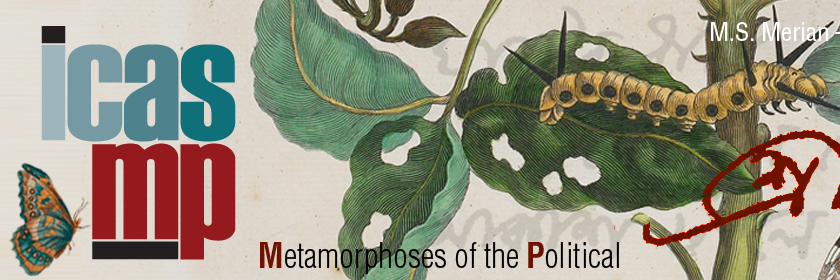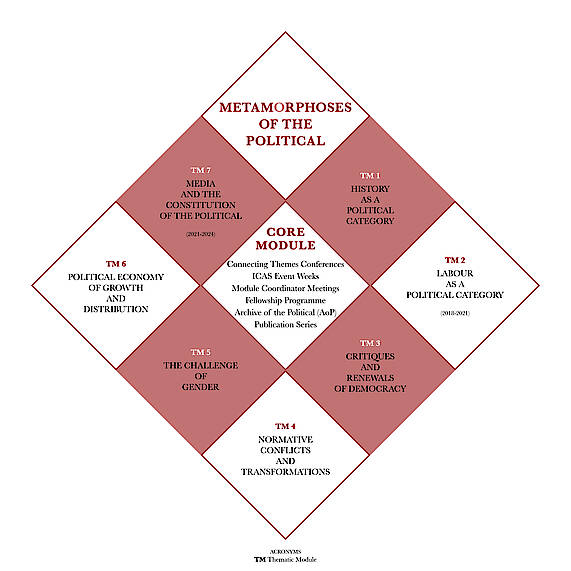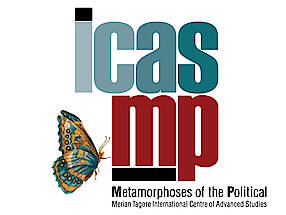
Metamorphoses of the Political
The ‚M. S. Merian – R. Tagore International Centre of Advanced Studies‘ (ICAS:MP) in New Delhi has been financed by the Federal Ministry of Education and Research since 2015. After a successful preliminary phase the project entered its main phase in summer 2018. The centre deals with “Metamorphoses of the Political in the Long Twentieth Century”.
The centre is a joint German-Indian project in the responsibility of
- the Centre for Modern India of Universität Würzburg
- the Centre for Modern Indian Studies (CeMIS) of Universität Göttingen,
- the Centre of the Study of Developing Societies (CSDS), New Delhi,
- the Institute of Economic Growth (IEG), New Delhi,
- the Max Weber secondary school for adults for cultural and social studies of Universität Erfurt and
- the Max Weber Foundation and its German Historical Institute London.
The head office of ICAS:MP is located in the Indian capital, New Delhi, and managed by a bi-national management committee.
ICAS:MP undertakes to study the variable history of “the political” in the long twentieth century, applying a comparative perspective. The differentiation between “politics” and “the political” is seen as a guiding paradigm in modern humanities. Politics in this context means the known institutions and procedures of political business, i.e. concrete political practice. The political, on the other hand, means the broader sphere of conflicting political convictions and the public domain in which society negotiates its constitution. ICAS:MP focuses on the study of political processes which occurred in various regions during the twentieth century.
The period studied by the project under aspects of global history was chosen deliberately. It is a period in which comparable phenomena of the political can be discerned in an increasingly entangled world, and some of the processes and developments initiated in that period continue today. In view of the changed role of the nation state, of the emergence of new social movements and the struggle of political ideologies for hegemony, it is obvious that the political is subject to constant change. What falls under the realm of the political, and who says so?
At the beginning of the twentieth century, the political sphere was immensely charged, as wide sections of the population were for the first time able to participate in institutional processes and to voice their concerns, for example in the form of the “social question”. These new possibilities of participation were met with suspicion by some, because they feared the masses were unable to govern or prone to manipulation. During the decades that followed, imperialism and colonialism were largely overcome: in some regions of the world nothing seemed to obstruct the triumphant advance of democracy. And yet it was an epoch of ideologies, which came to a head in the formation of the Cold War blocs. Influenced and driven by these events and experiences, a difference came to be made between the terms “politics” and “the political”, above all in the fields of social and political studies but also of philosophy and cultural history. Some scholars even believed that towards the end of the last century the political had entirely dissolved in a neo-liberal order, and thus, so to speak, come to a halt.
However, the political has by no means become insignificant, as is shown by events such as the Arab Spring; rather, it appears to be more changeable than ever before, occupying new fields of social practices, abandoning others and continuing to interact directly with politics. The ICAS:MP project aims to study not just the conceptualization and articulation but also the practical exercise of the political from an interdisciplinary perspective. This gives the scientists involved the opportunity to deploy the specific methodologies of their own specialist fields to gain a new access to the subject from various perspectives. ICAS:MP combines anthropology, historical science, political science, gender studies and economics.
One of the project’s essential intentions is triggering a dialogue between scientists who are researching into similar problems but have not had any points of contact so far due to their regional specialization. For this purpose ICAS:MP was conceived as a modular co-operation network. The central element is the module which gave the project its name, “Metamorphoses of the Political”: this is the framework and organizational authority. In addition, there are seven autonomous modules, distinguished by themes, with focus on the following key subjects:
- TM1: History as a Political Category
- TM2: Labour as a Political Category
- TM3: Critiques and Renewals of Democracy
- TM4: Normative Conflicts and Transformations
- TM5: The Challenge of Gender
- TM6: Political Economy of Growth and Distribution
- TM7: Media and the Construction of the Political

These modules provide a fellowship programme for international scientists, organize workshops and prepare pilot projects. They deal with key questions such as “What constitutes the sphere of the political in certain places?”, “What material and normative resources are required to be able to influence the political?”, “Are there any differences between the western and the non-western world? Are there any parallels or connections?”
ICAS:MP is designed as a collaborative project meant to drive interdisciplinary and international research in order to step beyond conventional theses and styles of thought and to promote the emergence of new knowledge and perspectives.
